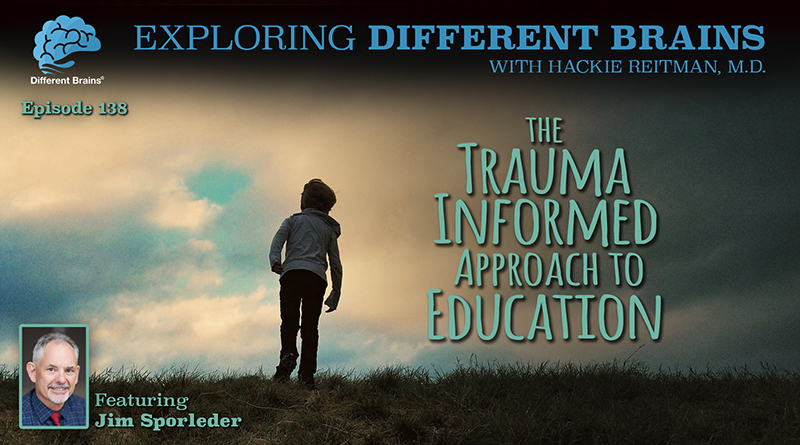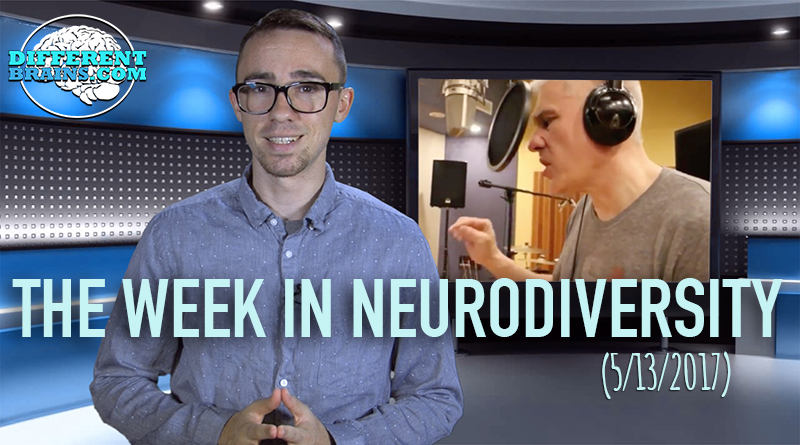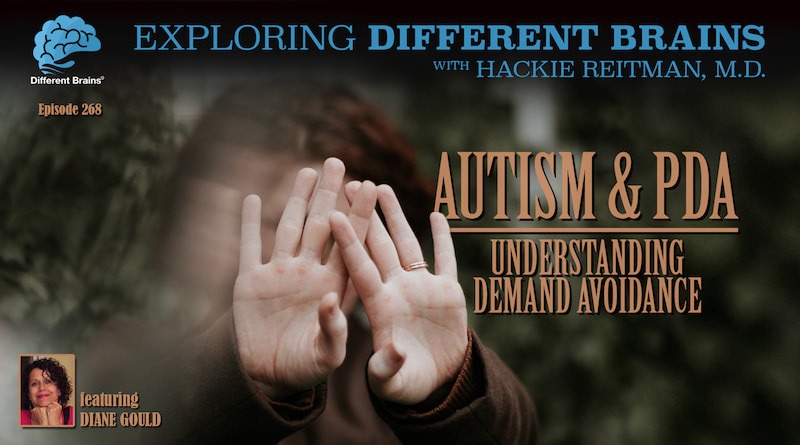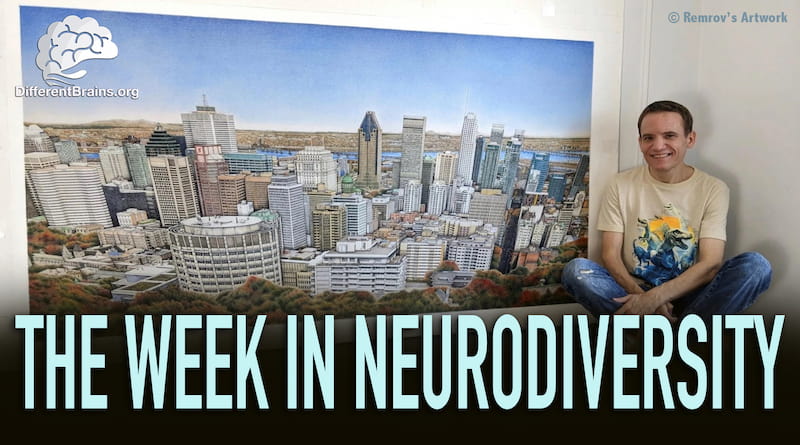
The Trauma Informed Approach to Education, with Jim Sporleder | EDB 138
Dr. Hackie Reitman speaks with returning guest and trauma informed consultant Jim Sporleder.
Jim retired in 2014 as Principal of Lincoln High School in Walla Walla, WA. Under Jim’s leadership, Lincoln High School became a “Trauma Informed” school, gaining national attention due to a dramatic drop in out of school suspensions, increased graduation rates and the number of students going on to post-secondary education. These dramatic changes at Lincoln caught the attention of Jamie Redford, who spent a year filming the documentary, Paper Tigers, which tells the Lincoln story. Jim is currently working as a trauma-informed coach / consultant as well as a trainer with the Children’s Resilience Initiative, based in Walla Walla. His travels as a consultant, keynote speaker, presenter and trainer have taken him all over the United States. Jim discusses what “trauma informed” is, its application both inside and outside the classroom, and how it has changed his approach to everyday life. (20 minutes)
For more about Jim: https://jimsporlederconsulting.com/
.
87 Second Preview:
.To listen or download the podcast version of this episode, see the embedded player below.
Or look for us on your favorite podcast provider:
iTunes | Stitcher | SoundCloud
FULL TRANSCRIPT
HACKIE REITMAN, M.D. (HR): Hi, I’m Dr. Hackie Reitman. Welcome to another episode of Exploring Different Brains. Today, we have coming back to see us again, one of my heroes, Jim Sporleder from Walla Walla Washington, and he’s going to tell us all about resilience and education and trauma-informed and so many other things. Jim, welcome.
JIM SPORLEDER (JS): Thank you, Hackie. It’s good to be back. I got back at you; you’re on my top list as one of my heroes as well. Thank you,
HR: For those who are meeting you for the first time.
JS: I’m Jim Sporleder, retired principal for the Lincoln High School in Walla Walla Washington. Lincoln’s known for those who have seen Paper Tigers the film, we were recognized for our work with our trauma-informed approach and the significant impact that we were seeing our kids once we made that mind-shift, looked at student discipline in a different way, really intentionally went after positive relationships and interactions with kids.
What is the trauma-informed approach?
HR: So explain to our audience who might not know what the trauma-informed approach is and how you got into it.
JS: It’s using the research we know of from the adverse childhood experiences, you know. Back in 2010, Hackie, there was a lot of resources. We had the study and some theory and at that time we had to figure it out on our own. What we were able to pull away from that many of our kids were coming to our schools so escalated from their toxic home environment that many of them, their brains, were not in a position to take in new knowledge or problem solve. They’re really triggers just ready to go off, and I had thought that for 2/3 of my career, I felt that I was a very heavily student relationship guy, but my discipline was more traditional, and I felt that discipline was a tool to teach and once I came upon this research, because I have always believed in and trained that discipline was a choice and it was not out of a student’s control. So when I was exposed to the research, it was very compelling. Really, it’s hard to explain what happened to me, but in 90 minutes Dr. John Medina turned my world upside down, and I realized that my discipline was not teaching, that I was punishing kids. It was the first time I had ever heard a brain expert or be able to even listen to the research or hear a brain expert share that the discipline wasn’t necessarily a choice, and it was out of a student’s control when they are in that high, escalated state. The part that we took out of that is that we have to continuously build on our caring adult relationship, so instead of reacting to the behavior, we started responding, which meant we started asking the kids what was going on versus telling them what they did wrong, and just that mind-shift in itself, the kids started telling us what was going on. They weren’t used to being asked what was going on, and when we found out the stories behind the behavior, it naturally brought the empathy out of you to know how these kids even make it to school.
HR: I remember one of the examples you gave me I still repeat the other people, that some of the very dramatic things that, you know, when you said, “Are you having a bad day?’ and he said, “As a matter fact I am,” you said, “Well what’s going on?” and one of the most dramatic ones I remember, but I’ll let you tell it. You tell some of the most dramatic ones. I remember one with the guy’s, the kid said, “Well, my dad got out of jail last night and murdered my mother,” That’ll put a crimp in your day you know? You’re not going to get too far disciplining such an individual.
JS: Well what became the norm, when I changed in my approach in the office, I saw a change immediately. When I started asking, the stories that these kids are coming up with are just crazy. I mean, you are able to value their voice, validate their feelings, we never validated the actions, and as these kids, they escalated while they were talking and sharing, it was so common that once they were escalated, they would just say, “Hey, I was wrong,” “I told the teacher that often,” and, “It has nothing to do with the teacher,” and, “I need to apologize,” and so, that part just, it took me by surprise and these kids not only took responsibility and followed up with the apologies. I never forced a kid to apologize And we held them accountable. But the accountability came at the end of the conversation when they were calm and they expected a consequence for their actions. And something that really stands out with me is from the very beginning when I was asking just simple questions, kids would say “thanks for talking to me.” And just by acknowledging their voice, they went away feeling like we had a conversation. And yet all I did was validate them. Validate their voice and ask them “what’s happening, where are you in your stress?” And we took it from there.
HR: I know when you turned around Lincoln out there in Washington State, what are some of the measurements that came out of that? What are some of the objective data as you saw things turn around?
JS: Well you know our, we took the baseline data prior to the year of implementation. And so just in our first year alone we went from sixty office referrals down to 135. And did the expulsion days down to–I believe it was about 15. And it improved every year after that. And in our student survey, in our first year of implementation, our students averaged 3.5 aces as a school. And the following year they jumped to 4.5 and in my last year they jumped to 5.5. It was like running an ER Room or trauma ER room. And the discipline continued to drop. In fact, in the last year and 5.5 aces, there were no expulsion days. So disciple dropped considerably. Our graduation rates just–we were put on, kind of like in Florida where they grade schools. We were given a horrible grade for our graduation rates, even when we were showing that we were improving, consistent improvement. But we ended up being at 78% in our graduation rate as an alternative high school. And the state average was 73, and our state assessment scores jumped over 30 percent. And so we were recognized for the academic growth that was achieved. And our dropout numbers went down. So with this trauma–I call it trauma responsive now because it creates maybe more of a need for action, put what we know in the action. With this model, we got everything that we would want for our kids. Behavior was coming down, all the numbers you want up are coming up, and the resilience in our kids is just incredible.
Children’s Resilience Initiative
HR: Well that’s a natural segway to the children’s resilience initiative you’re involved with. Tell our audience about that.
JS: Well I haven’t been as involved as I would like. But it’s still very active. The Children’s Resilience Initiative here in Walla Walla, they have continued their work locally. And Walla Walla is nationally known as a trauma informed community. So there’s been extensive training of our social service agencies, law enforcement, our state penitentiary. It’ just been amazing to see how far we’ve come as a community. And the Resilient–CRI, that’s the shorter version. They’ve just created the Train the Trainers Model. We just put on our second conference Beyond Paper Tigers her in June. And people are coming from all over the country. And so they backed it out a second year in a row. And I think it’s a conference that was sought out not only by educators but by all of our community partners.
Trauma informed in everyday life
HR: Well that’s great, and you know, the trauma informed or the trauma responsive approach. You can bring that into your everyday life. Just start looking at things through that prism. And when you go out and consult now because now you’re retired from being a principal. And now you’re out consulting and traveling and educating and teaching and advocating, what are some of the ways we can use this in our everyday life?
JS: Well we look at the foundational piece of the trauma responsive model. We look at what the science is telling us. You take all the brain science and everything that we know and maybe even push that off to the side is that we know that a parent-adult relationship is the game-changer for the lives of these kids. And the lives ot the adults that we’re working with. So the motivation is to create thee caring adult relationships which leads hope, healing, and the resilience of these folks that were there, that were adverse trotted experiences that are aces. Rather than being barriers it becomes stepping stones to them being able to look to the future with hope and achievement.
HR: And this can carry forward into the transition of the school to the workplace?
JS: Absolutely. You know, you brought up a good point in that–I guess one of ht biggest leaning things since we’ve talked is that I’m beginning to understand that it’s a transformation within who you are as a person. We don’t do trauma-informed and that’s one of the misnomers out there is that some schools will get a training and they kind of check box and say “we’re trauma informed, or we already had that training.” And always share trauma isn’t something we do. It is, it’s who we are. It’s who we become. And it becomes our identity, it becomes our culture, it’s how we take care of our kids, it’s how we take care of each other, our community, our parents. And I’ve known this, and I’m gonna give credit my Lincoln kids in transforming me. Now it’s how I treat the cab driver that gets me to the hotel. I wanna make sure that I have a positive interaction with that person or the car rental bus that takes me to the rental lot. I want that person to know that I recognize them and that I appreciate them. And so it’s always looking for positive intent. Because you never know that’s sunshine in their day that may make the difference. We didn’t have to know. But when it comes to who you are, you’re intentionally looking for those opportunities.
HR: And that translates to resilience. Would you say that?
JS: That’s the target. I think the beauty about the resilience piece is it’s not something that I gave them, it’s something that we model and they develop and internalize. So the resilience comes from within. And that’s the empowerment. It allows these students or the adults that we’re working with to move forward in their lives with hope. And in the setting. Empowerment, I got this, I can do it.
HR: Where does our audience go to read about this and learn more about this so they can quickly educate themselves in regard to trauma informed an trauma responsive, and resilience.
JS: I think the best resource we have, and I’m gonna say nationally, is the website, Acestoohigh.com. I think it’s up to about 13-14,000 members. And Dr. Falletie’s connected, a lot of our top champions are connected there, you can throw a question out if you want to learn more about a specific issue, you can throw it out there. Someone responds, somebody directs you. The trauma informed school movement. Heather Marge helped me write the book The Trauma Informed School. And that’s doing extremely well. And it’s a “how to.” So now we know the “why”, how do we do it? So the book has really been embraced and it’s really exciting to see the schools are able to take it and it supports their journey.
Paper Tigers
HR: And of course people can find where they can see Paper Tigers, the movie, that features you and Jamie Redford and also the movie Resilience as well.
JS: Paper Tigers is on Amazon now, Hackie. it’s $14, $14.95. And agency can buy it and bring it in and start showing it. Resilience is still, you’ve got to go through TUGG.org. And still gonna have to license that to show it. But I’d say in another year or two that’s gonna be available on DVD as well.
HR: Great. Okay, is there anything else you’d like to talk about that we haven’t covered?
JS: Now I’d like to take the opportunity to express my appreciation for the work that everybody’s doing. It’s hard work. But I don’t know of anything more fulfilling as you know to see students find home or an adult find home. A to see how that can impact their lives, see that they have gifts and talents they didn’t know they had and to see them put that to use. I just talked to one of my Lincoln Alumni last night. And he and another student are working on an app that–they’re learning coding. It’s just amazing, but I can’t tell you about the app yet because I promised i wouldn’t tell what it is. But it’s a brilliant idea and I was just blown away with how they even came up with the idea. But it will make people of poverty, it will make their lives a lot more efficient in how to survive.
HR: How do people get in touch with you Jim Sporleder? They wanna get you to speak or consult or ask you questions?
JS: My website, Jimsporlederconsulting.com. There’s contact information there.
HR: Okay, great. Jim, it’s a pleasure as always. Please keep in touch with us, and please keep up the great work you’re doing for so many. The world needs you.
JS: Well thank you, my friend. It’s been a great relationship, thank you.




